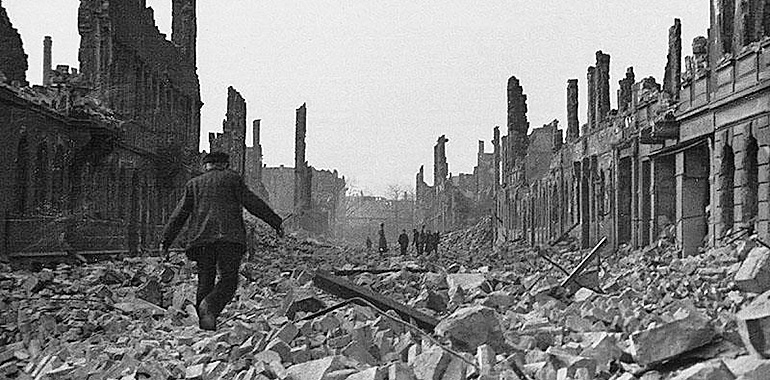 On February 13, 1945, one of the most atrocious events of World War II and world history occurred – the Allied bombing of Dresden. Half of the city’s buildings were destroyed and tens of thousands died in the ensuing firestorm… The Russian Military Historical Society issued a statement on the 70th anniversary of this tragedy.
On February 13, 1945, one of the most atrocious events of World War II and world history occurred – the Allied bombing of Dresden. Half of the city’s buildings were destroyed and tens of thousands died in the ensuing firestorm… The Russian Military Historical Society issued a statement on the 70th anniversary of this tragedy.
February 13 marks the 70th anniversary of one of the most hideous events of World War II – the bombing of Dresden by British and American aviation. A total of 1478 tons of high-explosive bombs and 1182 tons of firebombs were dropped on the city packed with refugees. This lead to a firestorm which swallowed up tens of thousands of women and children, 19 hospitals, 39 schools, 70 churches and chapels. The whirlwind of fire literally sucked in its unfortunate victims – the speed of the wind feeding the firestorm reached 200-250 kilometers per hour. Today the bombing of Dresden, which lasted three days, is considered a war crime, a general rehearsal for Hiroshima.
The technology applied here is horrifying. Eighty British and American bombers flying over Dresden at night first blew up wooden buildings standing since the Middle Ages and then showered them with fire bombs which set off thousands of fires. This was the same firestorm technology which earlier the Germans had used in the Blitz of Coventry. The bombing of that British is considered one of the most infamous crimes of Nazism.
Why did our Allies need to stain their hands with blood in Dresden and turn the civilians into ash? With the hindsight of 70 years, the motive of revenge seems to be secondary. In February 1945 it was already known that Dresden would be part of Soviet-occupied zone of post-war Germany. After the bombing of February 13 the Russians entered a city of burnt ruins and piles of corpses resembling, according to the memoirs of witnesses, fallen timber. So it seems the motive of frightening the Russians also played a role.
Just like Hiroshima, Dresden was supposed to serve as a demonstration to the Soviet Union of the power of the West. And in addition to power, a readiness to ignore all principles of humanity to achieve their aims. “Today it’s Dresden and Hiroshima, tomorrow it will be Gorky, Kuibyshev and Sverdlovsk – you understand, Mister Stalin?” Today we see this same cynicism manifested through the rocket attacks on cities of Eastern Ukraine.
Of course, everything was perfectly clear to the Soviet Union. Following the Great Patriotic War we had to not only rebuild destroyed cities and razed villages but also create a defensive shield. One of the most important lessons of the war was the commitment of our country and its people to humanism. The orders coming from the front-line commanders and supreme command were to not take revenge on the Germans. Not long before the bombing of Dresden our soldiers saved another ancient city from such a fate – the city of Krakow.
A very symbolic act was the saving of the collection of Dresden’s famous Grünes Gewölbe (Green Vault) museum by Soviet soldiers. The pictures were meticulously restored in the USSR and returned to Dresden after the city was rebuilt with the active participation of Soviet specialists and in part on our money.
People of the 21st century cannot forget about the ashes of Khatyn and tens of thousands of other Russian, Ukrainian and Belarussian villages, nor about Coventry, Dresden and Hiroshima. Their ashes continue to beat in our hearts. As long as humankind remembers, it will not allow new wars.
Source: The Russian Military Historical Society

 On February 13, 1945, one of the most atrocious events of World War II and world history occurred – the Allied bombing of Dresden. Half of the city’s buildings were destroyed and tens of thousands died in the ensuing firestorm… The Russian Military Historical Society issued a statement on the 70th anniversary of this tragedy.
On February 13, 1945, one of the most atrocious events of World War II and world history occurred – the Allied bombing of Dresden. Half of the city’s buildings were destroyed and tens of thousands died in the ensuing firestorm… The Russian Military Historical Society issued a statement on the 70th anniversary of this tragedy.





